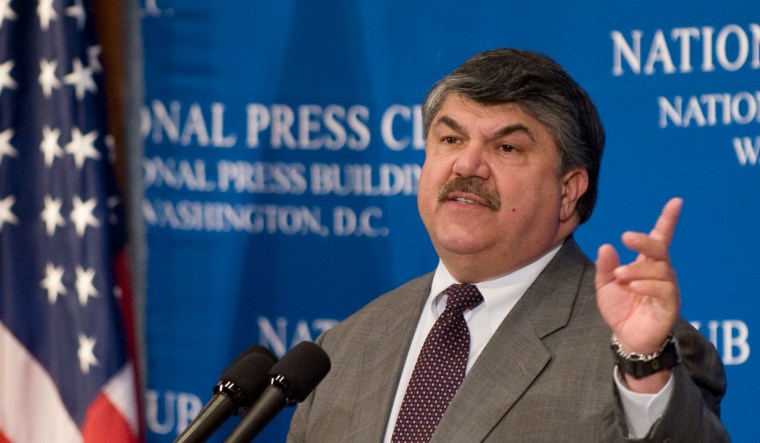The White House on Monday defended President Barack Obama's support for taxing high-value insurance plans to help pay for health care overhaul, a levy the AFL-CIO president angrily said "drives a wedge between the middle class and the poor."
Obama is scheduled to meet with labor leaders on the issue Monday afternoon. Labor opposes the tax, arguing it would hurt union members who negotiated good health benefits instead of salary increases.
Hours before the meeting, AFL-CIO president Richard Trumka lashed out at the so-called "Cadillac" tax in the Senate bill.
"The benefits tax in the Senate bill pits working Americans who need health care for their families against working Americans struggling to keep health care for their families," Trumka, who will be among those at the White House meeting, said in a speech. "This is a policy designed to benefit elites — in this case, insurers, hospitals, pharmaceutical companies and irresponsible employers, at the expense of the broader public."
At his daily press briefing, White House spokesman Robert Gibbs disputed that the insurance plan tax is similar to what Republican John McCain proposed while running against Obama for president.
McCain wanted to eliminate tax-free health benefits altogether. The plan Obama supports, which is part of the sweeping health care bill passed by the Senate, would tax insurance companies on plans worth more than $8,500 for individuals and $23,000 for families.
The approaches are "fundamentally different," Gibbs said. Trumka and other labor leaders say they aren't so different, arguing that the insurance plan tax would get passed down to working people.
Gibbs also indicated that Obama is open to adjusting the tax so it would affect fewer people. He said that would be discussed at Monday's meeting with Trumka and a dozen other major union heads.
The insurance plan tax is one of the sticking points between House and Senate Democrats as they work to reconcile health legislation passed by each chamber. They're looking for a product that Obama could embrace and sign into law in time for his State of the Union address sometime next month.
Many House members oppose the insurance plan tax. Their bill would raise income taxes on high-wage Americans instead.
But with Obama behind the Senate's insurance tax — which the president contends would help reduce spending on health care, one of his top goals — the final bill will likely include it in some form.
Trumka vowed that organized labor would fight "with everything we've got to win health care reform that is worthy of the support of working men and women."
But organized labor must walk a tightrope in its criticism of the bill. Unions are among Obama's strongest supporters and have spent millions in grass roots lobbying to garner support for his health overhaul plans.
Besides including the insurance tax, the Senate bill leaves out a new government-run coverage plan to compete with private insurers, another goal for organized labor. Still, unions have not suggested they would work to block final legislation that omits their top priorities.
Trumka called the White House visit "friends meeting friends to try and work through these problems."
The basic goals of the bills passed by the House and Senate are the same: extending coverage to more than 30 million uninsured Americans over the next decade by expanding Medicaid and imposing a new requirement for almost everyone to purchase insurance. Insurance industry practices such as denying health coverage to people with preexisting health conditions would be banned, and federal subsidies would help lower-income people buy insurance.
